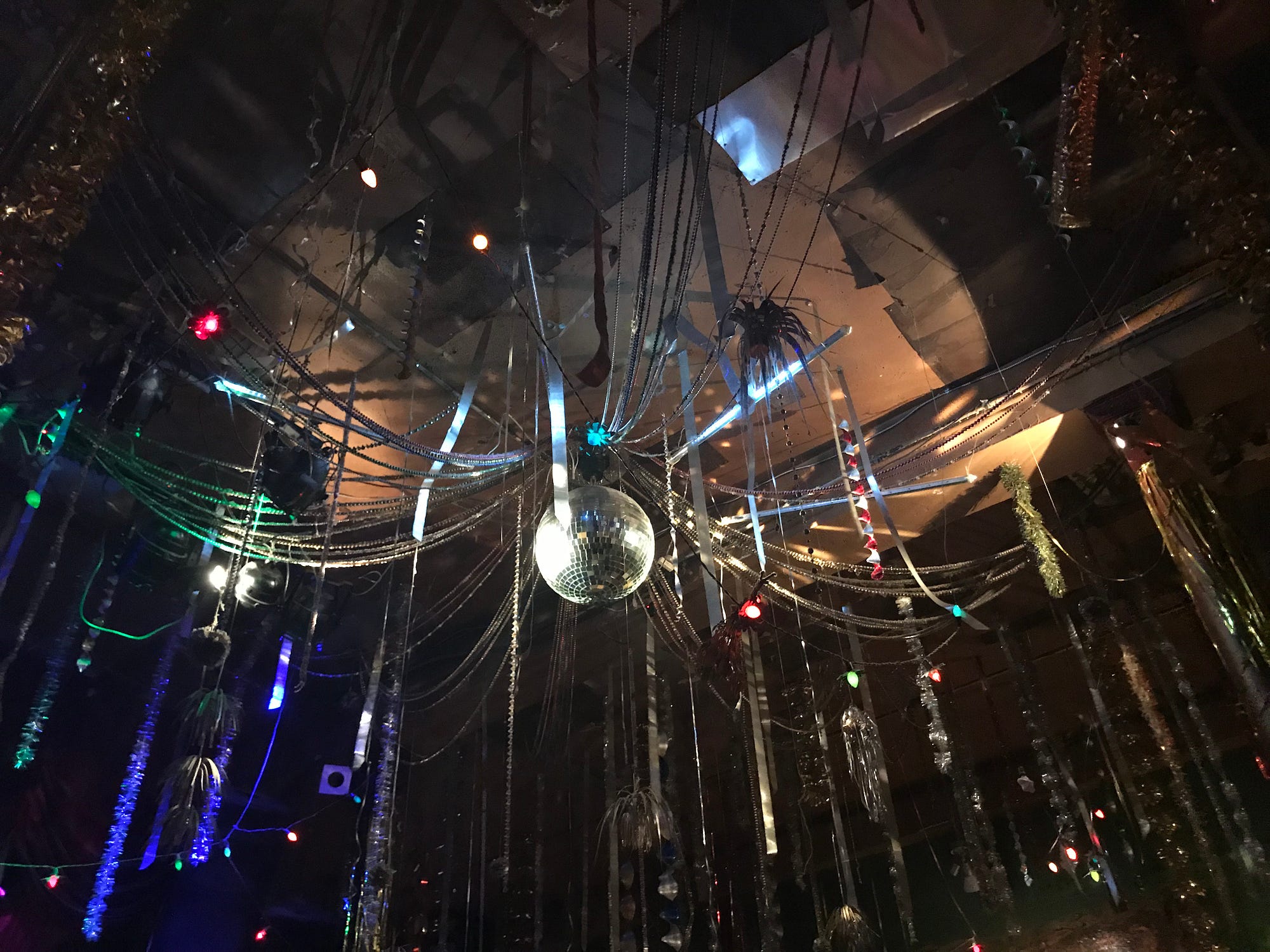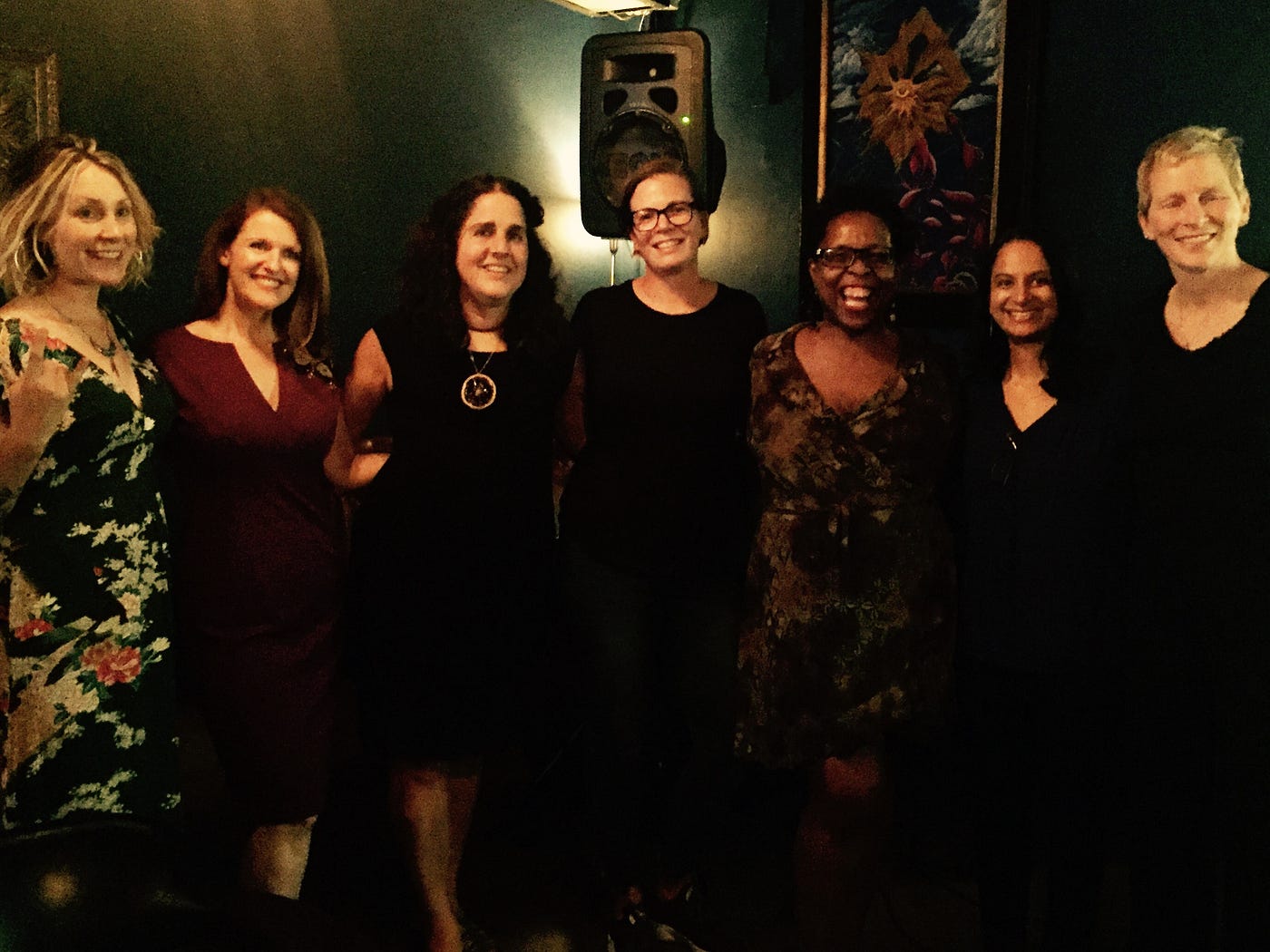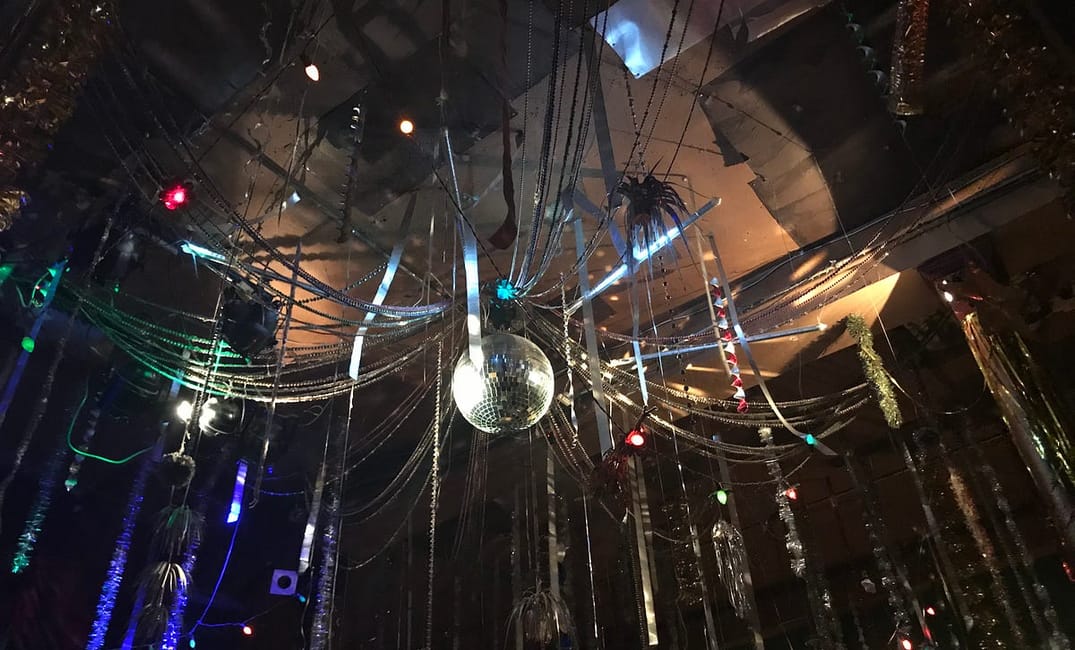
At one end of the Make-Out Room in the Mission, a large retro dresser sits on a stage, and a woman with dark, curly hair spins dance and party hits. The ceiling is covered in bright, shimmering garlands, and the animal mounts on the wall sport their own jewelry to match. If you walk in early on a Saturday night and see small groups of women chatting, eating pizza and swinging their hips in time to the music, you might think, “Hey, someone is having a party.” You might not immediately jump to the conclusion that this is a fundraiser for breast cancer. And for Bay Area Young Survivors, a support and action network for young women living with breast cancer, that’s the point.
Approximately 7 percent of breast cancer diagnoses in the United States occur in women under the age of 40, according to the American Cancer Society’s “2017 Facts and Figures.” This means that women in this demographic with a breast cancer diagnosis often find themselves between two world: they’re usually the youngest person in their support group, and their personal friends are all typically too young to have experiences with cancer. Bay Area Young Survivors (BAYS) aims to provide an environment in which these women can navigate the very specific challenges associated with a diagnosis at a young age.
BAYS strikes an important balance — they offer a no-nonsense and honest yet supportive environment for members as they navigate living with this disease.
On this particular Saturday night at the Make-Out Room, BAYS was throwing a dance party and fundraiser. Members could meet, mingle, dance and drink together, and a portion of the bar sales for the night went to supporting BAYS.
“We pride ourselves on offering support in a variety of ways for our members,” says Ami Dodson, a BAYS board member. “Not everyone wants to go to a support-group meeting, so we also offer a wide variety of social events…We’re always looking for things we can do that will appeal to a broad cross section of our members.”
BAYS strikes an important balance: they offer a no-nonsense and honest yet supportive environment for members as they navigate living with this disease. Their yearly anthology, to which members can contribute essays and personal stories about their own experiences with breast cancer, provides a key example of this, with titles like “The Day My Nipple Fell Off” and “Agony and Absurdity: Adventures in Cancerland.” BAYS members read from the latter during the 2017 San Francisco Lit Crawl in an event titled “Cancer As Fuck.” Here is an excerpt:
“Five and a half years ago, when I was just thirty-one years old, I received a phone call from a radiologist who needed some serious training on how to break bad news to a patient.
Lesson #2: There are a lot of very smart people who never got the memo on compassion or communication. You will want to punch them in the face, but you won’t, mainly because it’s better to not be arrested for assault.
The news this doctor so poorly delivered: I had breast cancer. What? No. Not now. I was just getting into my life groove. After years of watching friends settle into their marriages and careers and a couple of painful setbacks in my life (don’t fish, sweet pea, those are stories for another day), I had just met the most amazing man (I’ll spare you the suspense: it was your papa) and was halfway through finishing my PhD. We had plans to move to California and start a life together. Instead, he moved out West alone, and I moved in with your grandparents to start a yearlong treatment protocol. We made things work long distance until I was well enough to join him. Some long-distance couples keep the flame alive by sexting, but I sent him awkward chemo selfies — “Hey, look at me smiling cheerfully while I’m hooked up to this poison! Thumbs up, winky face!” But he stood by me, your papa. He is one incredible man.”
Yamini Ranchod, an epidemiologist, BAYS member and the author of the above excerpt, read during the Lit Crawl event and said that the anthology was an empowering way for her and other members to express themselves and to “speak their truths.”
“There’s a lot of just ‘Rah-rah, we can do this; we can beat this,’” says Ranchod. “And there’s nothing wrong with positivity, but not at the expense of truth— putting raw truth out there and saying, ‘This is hard, but we can rally around it and speak our own truths.’”
Ranchod says that the anthology was born from a group need to express themselves and to express what living with breast cancer at a young age is like. “We are here, and this is what happened to us, and we are not going to sugarcoat it and pretend that it isn’t hard,” says Ranchod. “Expressing ourselves—however we need to—is how we can rally together and deal with it.”
The anthology is one way that blunt honesty and straightforward and vulnerable conversation help BAYS members feel a little less afraid and anxious around their diagnoses. These open lines of communication continue in the group support environment.
“There’s a lot of just ‘Rah-rah, we can do this; we can beat this,’” says Ranchod. “And there’s nothing wrong with positivity, but not at the expense of truth, putting raw truth out there and saying, ‘This is hard, but we can rally around it and speak our own truths.’”
“It’s not pretty, and it’s not pink,” says Dodson. “It’s really difficult. We try very hard to provide that reality for our members…we try really hard to be very real about breast cancer and what it is and what it means and what you can expect.”
Dodson gives an example of one member who was recently diagnosed finding comfort by talking to those who had survived the disease and were several years out from their treatment.
“Talking to women who are seven years out, eight years out, ten years out has been really therapeutic to her — to get a sense [that] there is an other side,” says Dodson.

A lot of the comfort and dispelling of fear that BAYS provides comes from shedding light on what happens next — in treatment, in procedures, in life — because that’s not information readily available to the public. Dodson gives the example of how BAYS helped her understand the mastectomy process — “grody” parts and all.
“A good doctor will tell you, when you come home from a mastectomy, that you’re gonna have some drains,” says Dodson. “But what they won’t tell you, and what [BAYS] will tell you, is you’re gonna need special pajamas, because you won’t be able to lift up your arms. So before you have your surgery, you need to go buy yourself some fun, comfy, cozy, button-up-the-front jammies, because you’re gonna spend a week in bed in a fair bit of discomfort and pain.”
A lot of the comfort and dispelling of fear that BAYS provides comes from shedding light on what happens next — in treatment, in procedures, in life — because it’s not information readily available to the public.
“It’s grody. It’s totally grody,” says Dodson, about mastectomy. “I still remember the person who coached me on what that meant…the more that someone can be prepared for that, the less terrifying it feels.”
BAYS has been holding meetings for more than 10 years in the Bay Area, and it began because its founders, Angela Padilla and Deb Mosley, recognized the specific need for a breast cancer support group for women in a certain age demographic. Because of its destructive nature, getting a cancer diagnosis at a young age means that women who were otherwise starting families and furthering their careers may now be going through menopause or being asked about their will.
“A breast cancer diagnosis is so isolating and so terrifying,” says Dodson. “I was 35 when I was diagnosed, and I knew no one with breast cancer. My friends were having babies and getting married and launching careers, and I was facing this life-changing huge medical crisis…Having a support group of women who understand, who get it, who’ve been there—it really breaks down the isolation.”
Because of its destructive nature, getting a cancer diagnosis at a young age means that women who were otherwise starting families and furthering their careers may now be going through menopause or being asked about their will.
Support groups meet once a month in San Francisco, with additional meetings in various places across the Bay. In addition to these meetings, BAYS hosts a support group specifically for women with metastatic breast cancer called Mets in the City. Metastatic breast cancer is also known as stage 4 cancer and is classified as when cancer has moved to various other parts of the body — most frequently the bones, lungs, liver or brain. Once breast cancer moves into the metastatic stage, it can continue to be treated, but it cannot be cured.
“The women of Mets in the City often feel more comfortable with other metastatic women because it’s a different beast,” says Dodson. “It’s a different set of questions — you’re talking about end-of-life care and hospice and pain-management options.” In these cases, it is especially important to have the support and understanding of those who can truly empathize.
It’s overwhelming and devastating, but it doesn’t have to be faced alone.
To join, new members can post an introduction to the BAYS listserv or attend one of the support-group meetings. For those who are seeking support but are wondering if a group environment is necessarily for them, Dodson offers some words of advice.
“I encourage people to break down the barriers of isolation that a breast cancer diagnosis can bring,” says Dodson. “It’s overwhelming and devastating, but it doesn’t have to be faced alone.”







